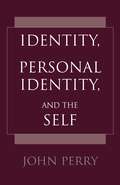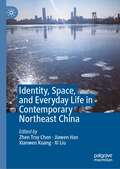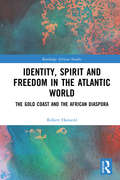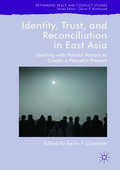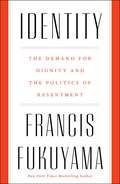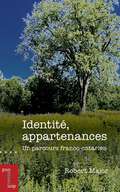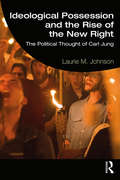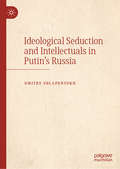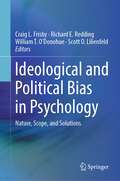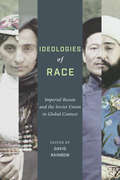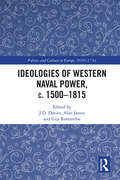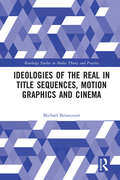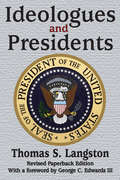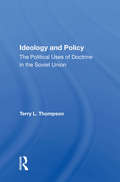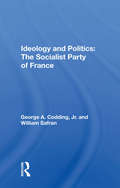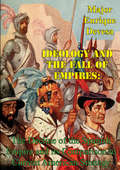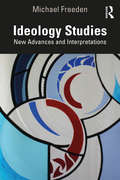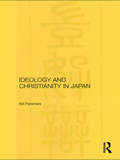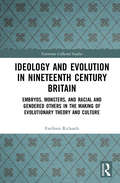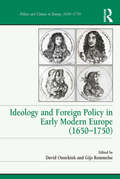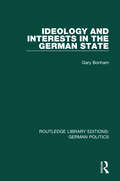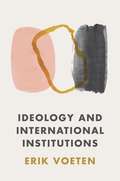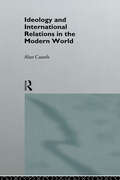- Table View
- List View
Identity, Personal Identity and the Self
by John PerryThis volume collects a number of Perry's classic works on personal identity as well as four new pieces, The Two Faces of Identity,Persons and Information,Self-Notions and The Self, and The Sense of Identity. Perry's Introduction puts his own work and that of others on the issues of identity and personal identity in the context of philosophical studies of mind and language over the past thirty years.
Identity, Space, and Everyday Life in Contemporary Northeast China
by Jiawen Han Xi Liu Zhen Troy Chen Xianwen KuangThis edited volume is first of its kind to document and critically analyse the changes took place snice China’s opening-up and reform and its impact on Dongbei, China’s North-East region, known for its remote and vast landscape, unique and othered culture, rich resources, mighty infrastructures and industries, geopolitical significance. Through presenting up-to-date and multidimensional case studies, the book covers three major aspects of Dongbei, which put people at the heart of our scholarly focus, namely people’s mediated life through traditional and new media; people’s social, cultural, and living spaces; artistic and fictional representations of people’s everyday life.
Identity, Spirit and Freedom in the Atlantic World: The Gold Coast and the African Diaspora (Routledge African Studies)
by Robert HanserdThis book applies oral, archival and other interdisciplinary evidence from West Africa and the Americas to analyses of new world Maroons, slaves and free blacks, examining a "Gold Coast" entrepot of Akan, Ga, Guan and other peoples in an Atlantic era of non-linear, mutable intersection of contested history and culture. Combining extant evidence with newer interdisciplinary insights to reconsider under-recognized histories and actors, Identity, Spirit and Freedom in the Atlantic World explores West African cosmologies, regional statecraft and socio-cultural practice, and the way they contributed to Atlantic ideas of freedom, identity and spirituality. Archival researches of British, Dutch and Danish Atlantic thoroughfares bring to light histories of royals, priests and others remade as captive laborers, Maroons and free blacks. Looking at Akwamu’s overtaking of Great Accra, Jamaica’s Maroon Wars, the 1712 Rebellion in New York and many other examples, this book explores the evolution of identity and spirituality in the diaspora of the Gold Coast and the Atlantic world. Identity, Spirit and Freedom in the Atlantic World will be of interest to scholars and students of African studies, the African diaspora, cultural studies and Atlantic and American history.
Identity, Trust, and Reconciliation in East Asia
by Kevin P ClementsThis edited collection explores how East Asia's painful history continues to haunt the relationships between its countries and peoples. Through a largely social-psychological and constructivist lens, the authors examine the ways in which historical memory and unmet identity needs generates mutual suspicion, xenophobic nationalism and tensions in the bilateral and trilateral relationships within the region. This text not only addresses some of the domestic drivers of Japanese, Chinese and South Korean foreign policy - and the implications of increasingly autocratic rule in all three countries - but also analyses the way in which new security mechanisms and processes advancing trust, confidence and reconciliation can replace those generating mistrust, antagonism and insecurity.
Identity: The Demand for Dignity and the Politics of Resentment
by Francis FukuyamaThe New York Times bestselling author of The Origins of Political Order offers a provocative examination of modern identity politics: its origins, its effects, and what it means for domestic and international affairs of stateIn 2014, Francis Fukuyama wrote that American institutions were in decay, as the state was progressively captured by powerful interest groups. Two years later, his predictions were borne out by the rise to power of a series of political outsiders whose economic nationalism and authoritarian tendencies threatened to destabilize the entire international order. These populist nationalists seek direct charismatic connection to “the people,” who are usually defined in narrow identity terms that offer an irresistible call to an in-group and exclude large parts of the population as a whole. Demand for recognition of one’s identity is a master concept that unifies much of what is going on in world politics today. The universal recognition on which liberal democracy is based has been increasingly challenged by narrower forms of recognition based on nation, religion, sect, race, ethnicity, or gender, which have resulted in anti-immigrant populism, the upsurge of politicized Islam, the fractious “identity liberalism” of college campuses, and the emergence of white nationalism. Populist nationalism, said to be rooted in economic motivation, actually springs from the demand for recognition and therefore cannot simply be satisfied by economic means. The demand for identity cannot be transcended; we must begin to shape identity in a way that supports rather than undermines democracy.Identity is an urgent and necessary book—a sharp warning that unless we forge a universal understanding of human dignity, we will doom ourselves to continuing conflict.
Identitätskonzepte in Michael Endes Werk (Abhandlungen zur Literaturwissenschaft)
by Anna BraunDiese Studie befasst sich mit den vielfältigen Identitätskonzepten im Werk von Michael Ende, vor allem mit Patchwork- und Geschlechtsidentitäten, kulturellen und hybriden Identitäten. Es wird gezeigt, wie die Figuren Identitäten konstruieren, welche Faktoren, Fähigkeiten und Ressourcen hierbei zum Gelingen oder Scheitern beitragen und welche Identitätsfragen in den Texten verhandelt werden. Auch die vielschichtigen Potentiale für die Identitätsarbeit der Leser*innen werden aufgezeigt und Impulse für den identitätsorientierten Literaturunterricht diskutiert. Die zu den Entstehungszeiten der Texte virulenten Diskurse und außertextuellen Konzepte werden einbezogen und ihre Verarbeitung in den Texten wird verdeutlicht, um ihre Verknüpfung mit identitätsrelevanten Fragen darstellen zu können. Analysiert werden die von der Forschung beachteten, mit Preisen ausgezeichneten und international rezipierten Texte, aber auch unbekanntere und von der Forschung bisher kaum beachtete Texte, darunter solche, die vor allem an Erwachsene adressiert sind.
Identité, appartenances: Un parcours franco-ontarien (Essais et fiction)
by Robert MajorThis book examines the Franco-Ontarian reality through the telling of an individual journey, that is representative of a generation. This account integrates autobiography, reflection, readings and research. A contemplation on the University of Ottawa and its historical role, which is the culmination of this particular journey, is the primary theme of the book.Its fundamental question: what does it mean to be Franco-Ontarian? Does it still make sense to hold on to a particular collective identity? Identities are often deadly, unfortunately, as history reveals. In the absolute, we are all human, brothers and sisters, fragile, destined for certain death, dust in the infinite, insignificant in space-time. "What is a man in infinity?" Pascal would have said. Why, then, should we cling to our particularities, drape them over ourselves with pride, or brandish them as banners? It's to glory in the accidents of one's selfhood, the chance of one's birth, the contingencies of one's true nature, that of being a human among other humans.And yet, nothing can be done about it. We can't choose our roots: they were there before we were born, and they pushed us towards the light. Everyone comes from a family, a group, a space, a culture, a people, and a nation. For we are not abstractions, nor pure spirits. We are embodied in a collective. The individual carries the group within him, and vice versa. With all the wealth and suffering that entails.
Ideological Possession and the Rise of the New Right: The Political Thought of Carl Jung
by Laurie M. JohnsonPolitical theorist Laurie M. Johnson deals with Jung’s analysis of the effects of modern scientific rationalism on the development of communism, fascism and Nazism in the 20th century and applies this analysis to the rise of the New Right in the 21st century. Jung’s thought provides much needed insight into contemporary ideologies such as neoliberalism, Identitarianism and the Alt-Right. Johnson explains Jungian analytical psychology as it relates to these topics, with a chapter devoted to Jung’s views of Friedrich Nietzsche, who exemplifies the modern problem with his proclamation that God is dead, and an in-depth discussion of Jung’s views on truth and the psychological function of religion as a safeguard against deadly mass movements. She then turns to Jung’s treatment of anti-Semitism and the Nazi movement, and his views on race and racism. Johnson applies these historical insights to the current manifestations of mass psychological disruption in the clash between neoliberals and the right-wing populist and Identitarian movements on the rise in North America and Europe. She concludes by discussing the search for an authentic and meaningful life in a West that rejects extremism and is open to authentic spiritual experiences as a counterbalance to mass mindedness. Ideological Possession and the Rise of the New Right will appeal to both undergraduate and graduate students of psychology and intellectual history. The book will also be of interest to those wishing to understand the new nationalist, nativist and Identarian movements.
Ideological Seduction and Intellectuals in Putin's Russia
by Dmitry ShlapentokhThis book examines the interplay between key rulers and intellectuals in creating and sustaining popular discourses that often help keep rulers in power. By focusing in particular on the relationship between Putin and Dugin during the early Putin regime, the author zooms in on the questionable honesty in Putin's interest in Dugin's philosophy, and the instrumentality of that philosophy for strategic regime building. Arguing that ideology is largely supported by political philosophies that gain popular traction, the book questions the extent to which rulers are likely to stay faithful to their stated ideologies. Providing on-the-ground insight into Putin's rule, this book appeals to researchers and policymakers studying Post-Soviet Politics.
Ideological and Political Bias in Psychology: Nature, Scope, and Solutions
by Scott O. Lilienfeld Craig L. Frisby William T. O’Donohue Richard E. ReddingThis book examines the traditional assumptions made by academics and professionals alike that have embedded sociopolitical biases that impede practice. and undermine efforts to achieve an objective scientific status. If allowed to go unchallenged, the credibility of psychology as a discipline is compromised. This contributed volume thoroughly and comprehensively examines this concern in a conceptually and empirically rigorous manner and offers constructive solutions for minimizing undue political influences within the field of psychology. Societies in the 21st century desperately need reliable psychological science, but we don’t have it. This important volume explains one of the main reasons why we are making little progress on any issue that gets contaminated by the left-right culture war: because the field of psychology is an enthusiastic member of one of the two teams, so it rejects findings and researchers who question its ideological commitments. The authors of this engaging volume also show us the way out. They diagnose the social dynamics of bias and point to reforms that would give us the psychology that we need to address 21st century problems. Jonathan Haidt, Thomas Cooley Professor of Ethical Leadership, NYU—Stern School of Business and author of The Righteous Mind The boundaries of free speech, censorship, moral cultures, social justice, and ideological biases are among the many incendiary topics discussed in this book. If you are looking for a deep-dive into real-world contemporary controversies, Ideological and Political Bias in Psychology fits the bill. The chapters are thoughtful and thought-provoking. Most readers will find something to agree with and something to rage at in almost every chapter. It just may change how you think about some of these topics. Diane F. Halpern, Professor of Psychology Emerita, Claremont McKenna College and Past President, American Psychological Association Unless the political left is always correct about everything (in which case, we wouldn’t need to do research; we could just ask a leftist), the growing political monoculture of social science is a major barrier to our search for the truth. This volume shows how ideological bias should be treated as a source of research error, up there with classic methodological flaws like non-random assignment and non-blind measurement. Steven Pinker, Johnstone Professor of Psychology, Harvard University, and the author of Rationality An important read for academics curious about how their politics fashions beliefs that too often are uncritically taken for granted, and for non-academics wondering why we can't shake off the politics that so influences scientific work. Vernon Smith, Nobel Laureate in Economic Sciences and George L. Argyros Chair in Finance and Economics, Chapman UniversityAdvances and deepens empirically rigorous scholarship into biased political influences affecting academic and professional psychology.Offers constructive solutions for minimizing undue political influences within psychology and moving the field forward.Serves as a resource for psychological academicians, researchers, practitioners, and consultants seeking to restore the principles of accurate science and effective practice to their respective areas of research.
Ideologies of Race: Imperial Russia and the Soviet Union in Global Context
by David RainbowIs the concept of "race" applicable to Russia and the Soviet Union? Citing the idea of Russian exceptionalism, many would argue that in the nineteenth and twentieth centuries, while nationalities mattered, race did not. Others insist that race mattered no less in Russia than it did for European neighbours and countries overseas. These conflicting notions have made it difficult to understand rising racial tensions in Russian and Eurasian societies in recent years. A collection of new studies that reevaluate the meaning of race in Russia and the Soviet Union, Ideologies of Race brings together historians, literary scholars, and anthropologists of Russia, the Soviet Union, Western Europe, the United States, the Caribbean, and Latin America. The essays shift the principle question from whether race meant the same thing in the region as it did in the "classic" racialized regimes such as Nazi Germany and the United States, to how race worked in Russia and the Soviet Union during various periods in time. Approaching race as an ideology, this book illuminates the complicated and sometimes contradictory intersection between ideas about race and racializing practices. An essential reminder of the tensions and biases that have had a direct and lasting impact on Russia, Ideologies of Race yields crucial insights into the global history of race and its ongoing effects in the contemporary world. Contributors include Adrienne Edgar (University of California, Santa Barbara), Aisha Khan (New York University), Alaina Lemon (University of Michigan), Susanna Soojung Lim (University of Oregon), Marina Mogilner (University of Illinois, Chicago), Brigid O'Keeffe (Brooklyn College), David Rainbow (University of Houston), Gunja SenGupta (Brooklyn College), Vera Tolz (University of Manchester), Anika Walke (Washington University, St. Louis), Barbara Weinstein (New York University), and Eric Weitz (City University of New York).
Ideologies of Race: Imperial Russia and the Soviet Union in Global Context
by David RainbowIs the concept of "race" applicable to Russia and the Soviet Union? Citing the idea of Russian exceptionalism, many would argue that in the nineteenth and twentieth centuries, while nationalities mattered, race did not. Others insist that race mattered no less in Russia than it did for European neighbours and countries overseas. These conflicting notions have made it difficult to understand rising racial tensions in Russian and Eurasian societies in recent years. A collection of new studies that reevaluate the meaning of race in Russia and the Soviet Union, Ideologies of Race brings together historians, literary scholars, and anthropologists of Russia, the Soviet Union, Western Europe, the United States, the Caribbean, and Latin America. The essays shift the principle question from whether race meant the same thing in the region as it did in the "classic" racialized regimes such as Nazi Germany and the United States, to how race worked in Russia and the Soviet Union during various periods in time. Approaching race as an ideology, this book illuminates the complicated and sometimes contradictory intersection between ideas about race and racializing practices. An essential reminder of the tensions and biases that have had a direct and lasting impact on Russia, Ideologies of Race yields crucial insights into the global history of race and its ongoing effects in the contemporary world. Contributors include Adrienne Edgar (University of California, Santa Barbara), Aisha Khan (New York University), Alaina Lemon (University of Michigan), Susanna Soojung Lim (University of Oregon), Marina Mogilner (University of Illinois, Chicago), Brigid O'Keeffe (Brooklyn College), David Rainbow (University of Houston), Gunja SenGupta (Brooklyn College), Vera Tolz (University of Manchester), Anika Walke (Washington University, St. Louis), Barbara Weinstein (New York University), and Eric Weitz (City University of New York).
Ideologies of Western Naval Power, c. 1500-1815 (Politics and Culture in Europe, 1650-1750)
by J. D. Davies Alan James Gijs RommelseThis ground-breaking book provides the first study of naval ideology, defined as the mass of cultural ideas and shared perspectives that, for early modern states and belief systems, justified the creation and use of naval forces. Sixteen scholars examine a wide range of themes over a wide time period and broad geographical range, embracing Britain, the Netherlands, France, Spain, Sweden, Russia, Venice and the United States, along with the "extra-national" polities of piracy, neutrality, and international Calvinism. This volume provides important and often provocative new insights into both the growth of western naval power and important elements of political, cultural and religious history.
Ideologies of the Real in Title Sequences, Motion Graphics and Cinema (Routledge Studies in Media Theory and Practice)
by Michael BetancourtThis book explores the question of realism in motion pictures. Specifically, it explores how understanding the role of realism in the history of title sequences in film can illuminate discussions raised by the advent of digital cinema. Ideologies of the Real in Title Sequences, Motion Graphics and Cinema fills a critical and theoretical void in the existing literature on motion graphics. Developed from careful analysis of André Bazin, Stanley Cavell, and Giles Deleuze’s approaches to cinematic realism, this analysis uses title sequences to engage the interface between narrative and non-narrative media to consider cinematic realism in depth through highly detailed close readings of the title sequences for Bullitt (1968), Kolchak: The Night Stalker (1974), The Number 23 (2007), The Kingdom (2008), Blade Runner: 2049 (2017) and the James Bond films. From this critique, author Michael Betancourt develops a modal approach to cinematic realism where ontology is irrelevant to indexicality. His analysis shows the continuity between historical analogue film and contemporary digital motion pictures by developing a framework for rethinking how realism shapes interpretation.
Ideologues and Presidents (American Presidents Ser.)
by Thomas S. LangstonIdeologues and Presidents argues that ideologues have been gaining influence in the modern presidency. There were plenty of ideologues in the New Deal, but they worked at cross purposes and could not count on the backing of the cagey pragmatist in the Oval Office. Three decades later, the Johnson White House systematically sought the help of hundreds of liberals in drawing up blueprints for policy changes. But when it came time to implement their plans, Lyndon Johnson's White House proved to have scant interest in ideological purity.By the time of the Reagan Revolution, the organizations that supported ideological assaults on government had never been stronger. The result was a level of ideological influence unmatched until the George W. Bush presidency. In Bush's administration, not only did anti-statists and social conservatives take up positions of influence throughout the government, but the president famously pursued an elective war that had been promoted for a decade by a networked band of ideologues.In the Barack Obama presidency, although progressive liberals have found their way into niches within the executive branch, the real ideological action continues to be Stage Right. How did American presidential politics come to be so entangled with ideology and ideologues? Ideologues and Presidents helps us move toward an answer to this vital question.
Ideology And Policy: The Political Uses Of Doctrine In The Soviet Union
by Terry L ThompsonRepresenting a milestone of further accomplishment in scholarly investigation of the dialectics for ideological evolution in the USSR, this book will be a treasure for all who are interested in the development of Soviet ideology and should merit the attention of all specialists in Soviet studies. It is uniquely valuable because it is the first exte
Ideology And Politics: The Socialist Party Of France
by George A. CoddingThis book explores the strengths and weaknesses of the French Socialist party—its history, ideology, organization, and constituency—as well as the reasons the party has remained a viable force in the French political system for over seventy years.
Ideology And The Fall Of Empires: The Decline Of The Spanish Empire And Its Comparison To Current American Strategy
by Major Enrique Gomariz DevesaSometimes, the ideology that formed the basis for founding an empire can become the cause of its fall. The decline of the Spanish Empire is a clear example of how ideology may both adversely influence national grand strategies and trigger processes of decline of an empire. The strong religious conviction of the Habsburgs was a fundamental factor in defining an imperial strategy that did not conform to the genuine interests of Spain as the core of the Empire. This strategy did not take into account limited Spanish capabilities that were not enough to achieve its religious goals.The purpose of this research is not to analyze in depth how religion influenced the decline of the Spanish Empire, but to use this process to establish a paradigm to explain how ideologies can become a negative influence on national policies. Once the paradigm is established, it will be compared to a similar process to develop some valid conclusions regarding the importance of defining national strategic objectives according to the interests and capabilities of each state.Over the last two decades, the desire to expand and promote democracy around the world became the dominant ideology in the United States. Therefore, its influence in the evolution of recent American national strategies serves as a valid comparison. This study presents some conclusions that not only might be applicable for the analysis and study of national strategies, but also may help to understand how and when ideologies that may be necessary to maintain the cohesion of nations and empires, can became a source of national decline.
Ideology Studies: New Advances and Interpretations
by Michael FreedenThis book comprehensively collects the thinking - over the last 25 years - of one the most important contemporary scholars in the field of ideology studies. Clearly organised, it expounds on the changing nature of the sub-discipline, its components and methods of investigation. As such, it serves the need for a general, well-informed identification and elaboration of thematic possibilities in current ideology studies and represents the most developed and productive methodological approach to the study of ideologies in the last three decades. Freeden presents ideology studies as an evolving and vibrant field, encountering and surmounting a series of challenges in its successful path towards recognition as a fully legitimate and respected branch of political theory. This book will be of key interest to students and scholars of political ideologies, political theory, political philosophy and more broadly to sociology, political science, anthropology, human geography, international studies and the humanities.
Ideology and Christianity in Japan (Routledge/Leiden Series in Modern East Asian Politics, History and Media)
by Kiri ParamoreIdeology and Christianity in Japan shows the major role played by Christian-related discourse in the formation of early-modern and modern Japanese political ideology. The book traces a history development of anti-Christian ideas in Japan from the banning of Christianity by the Tokugawa shogunate in the early 1600s, to the use of Christian and anti-Christian ideology in the construction of modern Japanese state institutions at the end of the 1800s. Kiri Paramore recasts the history of Christian-related discourse in Japan in a new paradigm showing its influence on modern thought and politics and demonstrates the direct links between the development of ideology in the modern Japanese state, and the construction of political thought in the early Tokugawa shogunate. Demonstrating hitherto ignored links in Japanese history between modern and early-modern, and between religious and political elements this book will appeal to students and scholars of Japanese history, religion and politics.
Ideology and Evolution in Nineteenth Century Britain: Embryos, Monsters, and Racial and Gendered Others in the Making of Evolutionary Theory and Culture (Variorum Collected Studies)
by Evelleen RichardsWritten over several decades and collected together for the first time, these richly detailed contextual studies by a leading historian of science examine the diverse ways in which cultural values and political and professional considerations impinged upon the construction, acceptance and applications of nineteenth century evolutionary theory. They include a number of interrelated analyses of the highly politicised roles of embryos and monsters in pre- and post- Darwinian evolutionary theorizing, including Darwin’s; several studies of the intersection of Darwinian science and its practitioners with issues of gender, race and sexuality, featuring a pioneering contextual analysis of Darwin’s theory of sexual selection; and explorations of responses to Darwinian science by notable Victorian women intellectuals, including the crusading anti-feminist and ardent Darwinian, Eliza Lynn Linton, the feminist and leading anti-vivisectionist Frances Power Cobbe, and Annie Besant, the bible-bashing, birth-control advocate who confronted Darwin’s opposition to contraception at the notorious Knowlton Trial.
Ideology and Foreign Policy in Early Modern Europe (Politics and Culture in Europe, 1650-1750)
by David Onnekink Gijs RommelseThe years 1650 to 1750 - sandwiched between an age of 'wars of religion' and an age of 'revolutionary wars' - have often been characterized as a 'de-ideologized' period. However, the essays in this collection contend that this is a mistaken assumption. For whilst international relations during this time may lack the obvious polarization between Catholic and Protestant visible in the proceeding hundred years, or the highly charged contest between monarchies and republics of the late eighteenth century, it is forcibly argued that ideology had a fundamental part to play in this crucial transformative stage of European history. Many early modernists have paid little attention to international relations theory, often taking a 'Realist' approach that emphasizes the anarchism, materialism and power-political nature of international relations. In contrast, this volume provides alternative perspectives, viewing international relations as socially constructed and influenced by ideas, ideology and identities. Building on such theoretical developments, allows international relations after 1648 to be fundamentally reconsidered, by putting political and economic ideology firmly back into the picture. By engaging with, and building upon, recent theoretical developments, this collection treads new terrain. Not only does it integrate cultural history with high politics and foreign policy, it also engages directly with themes discussed by political scientists and international relations theorists. As such it offers a fresh, and genuinely interdisciplinary approach to this complex and fundamental period in Europe's development.
Ideology and Interests in the German State (Routledge Library Editions: German Politics)
by Gary BonhamThis book addresses major theoretical issues in the fields of public administration and comparative politics. It discusses the role which ideology played as a unifying force for at least parts of the German state bureaucracy in Wilhelmine Germany . The examination of a modernizing ideology in the German case is useful for an understanding of the political dynamics of state-led modernization and industrial strategy in many contemporary societies and the author explains political behaviour and relations in Germany in general terms that are universally relevant.
Ideology and International Institutions
by Erik VoetenA new theoretical framework for understanding how social, economic, and political conflicts influence international institutions and their place in the global order Today’s liberal international institutional order is being challenged by the rising power of illiberal states and by domestic political changes inside liberal states. Against this backdrop, Ideology and International Institutions offers a broader understanding of international institutions by arguing that the politics of multilateralism has always been based on ideology and ideological divisions. Erik Voeten develops new theories and measures to make sense of past and current challenges to multilateral institutions.Voeten presents a straightforward theoretical framework that analyzes multilateral institutions as attempts by states to shift the policies of others toward their preferred ideological positions. He then measures how states have positioned themselves in global ideological conflicts during the past seventy-five years. Empirical chapters illustrate how ideological struggles shape the design of international institutions, membership in international institutions, and the critical role of multilateral institutions in militarized conflicts. Voeten also examines populism’s rise and other ideological threats to the liberal international order.Ideology and International Institutions explores the essential ways in which ideological contestation has influenced world politics.
Ideology and International Relations in the Modern World (The New International History)
by Alan CasselsCassels offers a novel perspective on the part played by ideology in international relations over the past two centuries. His treatment is not restricted to the familiar totalitarian ideologies of communism and nazism, but also includes conservatism, liberalism and nationalism. The focus and emphasis given to ideology in an historical survey of such broad scope make this book unusual, and even controversial.
